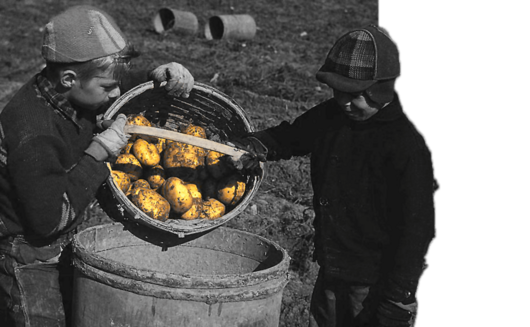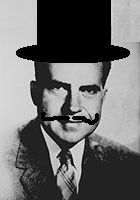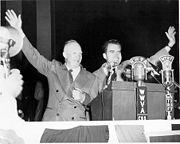Dwight D. Eisenhower
“Things are more like they are now than they ever were before.”
Dwight David "Ike" Eisenhower (October 14, 1890 – March 28, 1969) was the 34th President of the United States of America. Prior to becoming president, Eisenhower was a five-star general in the U.S. Army Catering Corps, and played a vital role in creating the pies for the climactic pie-fight finale of World War II.
Eisenhower was born in Kansas. His family belonged to a Mennonite sect that preached non-violence and non-comedy. This would lead to young Dwight breaking with his family religion when he graduated from West Point with a major in pie throwing. In 1916 Eisenhower married Mamie Pitstains.
Military Career
“A career in the good old U.S. Army! What more could a young man ask for?”
“Oh, fuck.”
WWI
After attending West Point, Eisenhower became a Second Lieutenant in a field kitchen on the Western Front during World War I. It was here that he first met real life comedy soldiers. These were mostly incompetent soldiers who were on KP after hilariously accidentally enraging their respective sergeants.
Although initially enthusiastic about his position, Eisenhower soon became disenchanted. The custard pies that the Americans were using at the front were vastly inferior to the more aerodynamic strudels that the German soldiers were throwing, leading to a great number of Americans being forced to stop in their tracks, blink, and wipe the pastry from one eye. Eisenhower brought this matter to the army brass, who laughed off his suggestions, pointing out that the American pie was still a far more humiliating weapon than the pear tarts used by the French [1] or the buckets of whitewash being employed by the Royal British Music Hall Brigade.
After lengthy conversations with George S. Patton – then a rising young officer in the Klown Kar Korps – Eisenhower resolved to remain in the Catering Corps after the war in order to create wackier ammunition for future U.S. food fights.
Between the Wars
The Philippines
By the end of the war, Eisenhower had risen to the rank of captain. Declining an offer to train incompetent soldiers to turn the wrong way and thus hit each other with their rifle barrels, he opted to become assistant to General MacArthur. As commander of US forces in the Philippines, MacArthur's main task was creating ethnic jokes about the Filipinos. Eisenhower was reluctantly obliged to put his pies on the back burner [2] in order to carry out costly taxpayer-funded research into the number of Filipinos it takes to change a light bulb. [3]
Upon the conclusion of this research, Eisenhower lobbied for and was granted a transfer to Fort Courage, where he would serve under the man who was to become his mentor, Gen. Buster Keaton.
General Keaton
General Keaton was a comedy legend in the US forces. In the Great War, he had pioneered the use of tanks to drive through enemy chicken coops, fruit barrows and panes of sheet glass, but his career began far earlier. During Pershing's struggle against Pancho Villa, he inflicted severe defeat upon the guerrilla leader by using a false "Pancho Villa" mustache, and aping his walk. Earlier, during the Boxer Rebellion, he had personally lead the 3rd Dribble Cup Brigade during the assault on Hung Lo.
Eisenhower idolized his new commander, and resolved to learn all he could on the ancient art of humor in uniform. In particular, Eisenhower took to heart Keaton's theories about making certain that every platoon contained the right mix of "stock characters", including an angry sergeant, a shifty corporal, a rich guy (either a recent West point graduate or a reluctant draftee), and a dumb son of a bitch. Eisenhower tinkered with this basic pattern, adding some light ethnic comedy, usually involving a Scandinavian who pronounced the letter "J" as "Y".
Baking
Continuing his baking experiments on his own time, Eisenhower discovered a lightweight pastry that increased the range of American pies. Combined with Admiral Nimitz's development of the high-pressure seltzer bottle and General Doolittle's development of the piñata bomb, this advance was to help ensure the supremacy of America's comedic arsenal into the Television Age.
HELLo
WWII
When the Second World War broke out after Hitler sold Stalin some shampoo that made his hair go a funny color, Eisenhower was placed in overall charge of Allied forces in Europe. At the time, the situation was hilarious grim. German troops hilariously exaggerated goose stepping had forced French troops to pratfall back to Paris. The British expeditionary force was caught with its pants down (literally) and subjected to a series of devastating double entendres. The Nazis then turned their attention to Russia, then in the middle of a crippling joke shortage that ran from 1232 AD–present.
Eisenhower realized that he had to turn the tide quickly. He also realized that the Germans' biggest weakness was their tendency to believe that anybody dressed up as Hitler probably is Hitler, so he had a large group of Hitler impersonators parachuted into occupied territory.
With the Germans thus distracted, Eisenhower personally led a panty-raid on the Reichstag. The raid was a partial success, with many primary objectives attained; but Field Marshal Erwin "The Desert Fox" Rommel pursued the retreating raiders across Europe. The wiley Eisenhower escaped by jumping his staff jeep over a river. Rommel's tank was unable to make the jump, and a humiliated Rommel fell out of the driver's seat into the Rhine, yelling “Auch, Hundgegangen es!” [4]
D-Day
With the conflict in Europe escalating out of control, Hitler confronted Eisenhower and suggested that the Axis and the Allies settle their differences at the annual D-Day inter-camp sports day on Lake Winnabola. Sportingly, Eisenhower agreed, knowing full well that the snooty kids of the Axis would not be playing fair, so he had his own people watching them. Thus, when Martin Borman put itching powder in the Allied sack-race sacks, General Patton cunningly switched sacks with the Axis. When Admiral Dönitz attempted to sneakily win the canoe race by torpedoing Allied canoes, he found his crew could barely move since Field Marshal Montgomery had replaced their uniforms with ones that were several sizes too small.
In spite of all this skulduggery, the score remained neck and neck until the eating contest. The Allies' champion eater Winston Churchill went head to head against Heinrich Himmler. Himmler was winning, until Eisenhower noticed that it wasn't really Himmler after all – it was Joseph Goebbels disguised in a fat suit that had a hollow front for storing food!
Naturally, Eisenhower declared “Food fight!” and the Allies emerged victorious. A grateful America decided to make him their leader, but decided to wait six or seven years before doing so, just so they could milk some more military service out of him it didn't go to his head.
Pre-Presidency
The 1952 Presidential election campaign: I LIKE IKE!
In 1952, the U.S. public sought to make Eisenhower their leader, and the "Draft Eisenhower" movement began.
“Draft Eisenhower? But I'm already in the army. In fact I'm the head of NATO... Oh, now I get it! You guys...”
Never one to shirk his responsibilities, Ike immediately set out to the Republican convention on the forbidden Plateau of Leng in Michigan. There are two ways to become Republican presidential candidate: to win a plurality of voted from state delegations, or to pull the mystical sword known as Berwale the Avenger out of Ulysses S. Grant's liver. Eisenhower was the first – and so far only – man to perform both these mighty deeds. [5]
As a man of great courage, honesty, integrity, and virtue, Eisenhower decided to "balance the ticket" by selecting a running mate who was a contemptible piece of shit. Naturally, he chose Richard M. Nixon, a man once described as “...a vile, twisted Machiavellian douchebag” by his own mother. [6]
Eisenhower ran on a strict policy of anti-Communism, which really set him apart from all those pro-Communists in 1950s American politics. He also secured the vital "greaser" vote by promising to build a vast intercity highway system including federally funded drag-strips, and start a National Endowment for Chrome. His campaign slogan was the simple but effective “I LIKE IKE”. When Nixon first ran for President in 1960, his attempt to adapt this slogan as “I LIKE DICK” contributed substantially to his loss.
Presidency
As President, he basically just played golf and took long naps. This was known as the Eisenhower Doctrine, and the 1950's American populace found it to be perfectly swell. For this, he was honored as Time's Man of the Year.
No really, the Presidency
All right, all right. As everyone knows. Eisenhower kept his promise to build the highway system. What is less well known is that he built large portions of it personally. When work on the system began, Eisenhower performed the groundbreaking ceremony but, due to one of those wacky misunderstandings that were to become a trademark of his presidency, no one told him the whole thing was symbolic. As a result, Eisenhower personally built 1,200 miles of interstate highway, or over a quarter of the system overall.
As a result of this eccentric behavior, Eisenhower's cabinet was obliged to follow him around the nation, having ad hoc meetings during Ike's breaks. When not discussing vital national and world events, the cabinet generally occupied themselves with leaning on shovels and making suggestive remarks to passing women.
Domestic policy
Eisenhower's domestic policy was threefold.
Firstly, Eisenhower was fearful of the growing influence of disreputable crooners such as Frank Sinatra and Bing Crosby and others. In an attempt to curb this influence, he saw the need to ween American youngsters off this dangerous music and onto a new form that he had invented, called "Rock and Roll". Eisenhower's music – based on a synthesis of twelve-bar blues, gospel and country, with a characteristic 4/4 time and a back beat – was initially slow to take off. The turning point came when Herbert Hoover invented the electric guitar. This allowed early "rockers" such as Eisenhower, John Wayne and Joe McCarthy to play larger venues, and the genre finally found its audience.
Secondly, Eisenhower sought to reduce overall levels of crime by gathering together America's top superheroes into the world's most powerful crime fighting force. When informed that there are no such things as superheroes, Eisenhower was reluctantly forced to form the League of Heroic Animals. Consisting of Lassie, Detective Chimp, Trigger, Charlotte A. Cavatacus and Ricochet Rabbit, the League's successes meant that today the U.S.A. is 97% free of criminal gangs lead by voles.
Thirdly, Eisenhower was very concerned about the left. After all, if he didn't correct his tendency to hook, how was he to improve his handicap? To combat this problem, Eisenhower created the new position of National Golf Pro. This remained a cabinet level position until George W. Bush merged the Department of Golf with the National Skeeball Academy.
Diplomatic relations with William Fershaw, Jr.
On the 18th of July, 1957, Eisenhower became the first president to open diplomatic relations between the White House and nine year old Washington, D.C. resident William "Billy" Fershaw, Jr. This occurred at 10:15 a.m., when Ike opened the window of the Oval Office and demanded to know what Billy was doing on his lawn.
Billy declined to comment, instead opting to move away at speed. However, at 12.35 that same day, he was again observed, flagrantly violating U.S. flower bed space. Eisenhower again initiated contact, demanding that Fershaw remove himself. This time, Fershaw claimed to be looking for a baseball he'd hit over the fence. On the advice of the State Department, Eisenhower cited UN Resolution 302, which clearly states that territorial incursions in pursuit of a ball, Frisbee, kite or javelin shall not be considered permissible if the pursuit of the lost object or objects poses a significant risk to Mrs. Eisenhower's prize begonias.
Deliberately ignoring his obligations under international law, Billy replied that “...jeepers, Mister [Eisenhower], I won't take long”. Rather than escalate the conflict through immediate hostilities, Eisenhower initiated Operation Wave Garden Rake in Vaguely Threatening Manner. For a few tense seconds, both sides seemed locked in their brinkmanship. Then Fershaw produced a baseball from behind the Warren G. Harding Memorial Garden Gnome, and withdrew from the White House lawn.
Eisenhower called a press conference, and explained that the Fershaw Crisis had been defused without casualties. However, halfway through the interview, a carelessly hit baseball came smashing through the Oval Office windows. Eisenhower then called the Strategic Air Command, and ordered them to ring Billy's mother and complain.
Post-Presidency
Nobody told Eisenhower that his presidency ended in 1960. He spent the remaining nine years of his life erroneously believing himself the be the Commander-in-Chief of the greatest military power of all time. He therefore occupied himself with playing golf and taking long naps. Occasionally, he'd build a highway or two, and once he went to Taiwan as a peacekeeping force. One time, he went to a crucial summit meeting between Khrushchev and JFK, but everybody was too polite to mention this faux pas. The kindly folk at the Kremlin printing office even made up a dummy treaty for him to sign, which everyone agreed was a nice gesture.
He finally perished in one of the few 1969 deaths not to involve the brown acid.
Criticism
Over the years, historians and commentators have generally been positive about the Eisenhower presidency. Notable books praising him include Prof. Richard C. Haysburrough's 1972 biography Eisenhower: a Critical Appraisal, Arnold Palmer's 1967 book Improve Your Putting the Eisenhower Way! and Andrea True's 1976 disco hit "Ike, Ike, Ike (How Do You Like Me?)".
However, in recent years a second school of thought has emerged, questioning Eisenhower's achievements. Known as the "mean old man" school of Eisenhower studies, it began with Dr. William Fershaw's 1997 biography Eisenhower: Poopyhead!. The themes of this book have been carried on in Fershaw's later works including Ike: Jerk, Get Me Grounded, Will You? and most recently I Keyed Your Car, Old Man, Ha Ha Ha!
Dwight D. Eisenhower in Unpopular Culture
- Philip Glass wrote an eighteen hour tone-poem entitled Eisenhower: Warrior Golfer. Playing the CD recording of its only performance is banned under the Geneva Convention.
- Carpet Burn Aficionado magazine named Eisenhower one of the "top 100 people who wouldn't give us the time of day".
- The mascot of Gor Fandom Anonymous is a chibi-Eisenhower called "Ikey".
- Goa Tse may or may not have said something about Eisenhower, but I'm not about to check. Are you? Didn't think so.
Notes
- ^ ...who had already surrendered, of course.
- ^ Metaphorically, obviously.
- ^ In spite of the Pentagon's high hopes regarding this project, the answer unfortunately turned out to be "one".
- ^ [trans] “Aw, doggone it!”
- ^ Pat Buchanan claims to have repeated this feat in 1988, but Republican Party records deny he ever won the support of the convention, and photographic evidence clearly shows that the "magic sword" was in fact a plastic lightsaber.
- ^ Actually, Mrs. Nixon was a very nice person, and would never have said such a thing. Obviously, though, she went through life thinking it pretty loudly.
| Preceded by: Harry S. Truman |
President of the United States 1953–1961 AD |
Succeeded by: John F. Kennedy |








